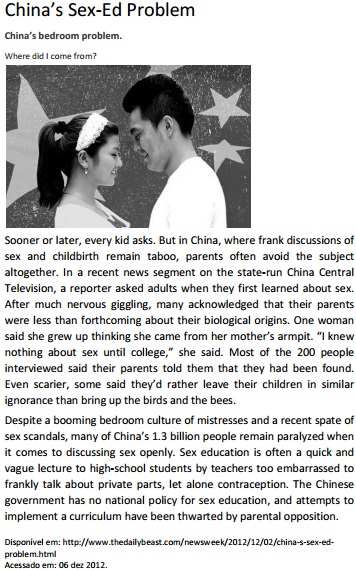Questões de Vestibular de Inglês - Advérbios e conjunções | Adverbs and conjunctions
Foram encontradas 20 questões
Genetically modified foods
Genetically modified (GM) foods are foods derived from organisms whose genetic material (DNA) has been modified in a way that does not occur naturally, e.g. through the introduction of a gene from a different organism. Currently available GM foods stem mostly from plants, but in the future foods derived from GM microorganisms or GM animals are likely to be introduced on the market. Most existing genetically modified crops have been developed to improve yield, through the introduction of resistance to plant diseases or of increased tolerance of herbicides.
In the future, genetic modification could be aimed at altering the nutrient content of food, reducing its allergenic potential, or improving the efficiency of food production systems. All GM foods should be assessed before being allowed on the market. FAO/WHO Codex guidelines exist for risk analysis of GM food.
(www.who.int)
 . Today, Cohen, 49, is the Brooklyn-based founder of BetterThanFiction Productions, a documentary film company; Khan is the director of the University of Cape Town Opera School. “I Live to Sing," a feature-length documentary directed and produced by Cohen, focuses on three of Khan's black students who made their way from humble beginnings in often poverty-ridden townships to excel in opera ‒an art form most closely associated with white, elite audiences and performers.
. Today, Cohen, 49, is the Brooklyn-based founder of BetterThanFiction Productions, a documentary film company; Khan is the director of the University of Cape Town Opera School. “I Live to Sing," a feature-length documentary directed and produced by Cohen, focuses on three of Khan's black students who made their way from humble beginnings in often poverty-ridden townships to excel in opera ‒an art form most closely associated with white, elite audiences and performers.
 it starts to sound.
it starts to sound.
 é:
é:

A palavra Despite, que inicia o 2º parágrafo, é usada para
"Luka"
Written by Suzanne Vega
My name is Luka
I live on the second floor
I live upstairs from you
Yes I think you've seen me before
If you hear something late at night
Some kind of trouble. some kind of fight
Just don't ask me what it was
I think it's because I'm clumsy
I try not to talk too loud
Maybe it's because I'm crazy
I try not to act too proud
They only hit until you cry
After that you don't ask why
You just don't argue anymore
Yes I think I'm okay
I walked into the door again
Well, if you ask that's what I'll say
And it's not your business anyway
I guess I'd like to be alone
With nothing broken, nothing thrown
Just don't ask me how I am
